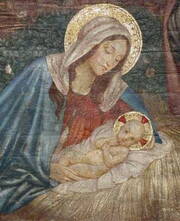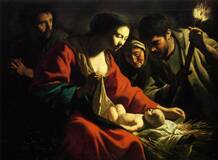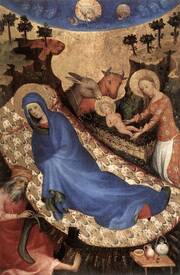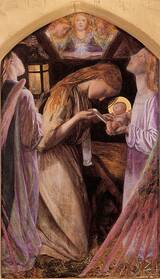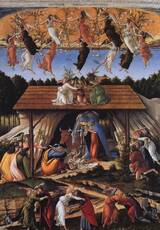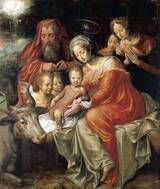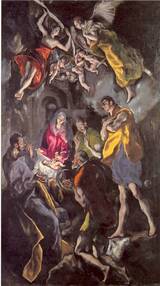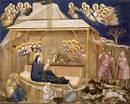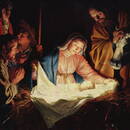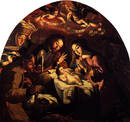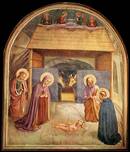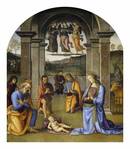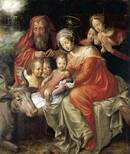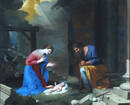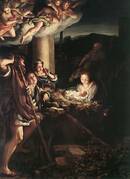The Nativity of Our Lord Jesus
Jesus's birthday
Solemnity - 25th December - Christmas
3rd Joyful Mystery of the Rosary
Our Holy Father celebrates Midnight Mass in St Peter's Basilica each Christmas, giving a blessing to the world (Urbi et Orbi) at midday from the central loggia.
Benedict XVI gave us his encyclical God is Love on Christmas Day 2005.
Pope Francis's words at Christmas in: 2017, 2016, 2015, 2014 & 2013
Papa Benedict XVI's words at Christmas in: 2012, 2011, 2010, 2009, 2008, 2007, 2006 & 2005.
St John Paul II's words at Christmas in: 2004, 2003, 2002, 2001, 2000, 1999, 1998, 1997, 1996, 1995, 1994, 1993, 1992, 1991, 1990, 1989, 1988, 1987, 1986, 1985, 1984, 1983, 1982, 1981, 1980, 1979 & 1978.
He was made man - Catechesis with Benedict XVI ![]()
"The Logos, who is with God, the Logos who is God, the Creator of the world, for whom all things were created, who has accompanied and accompanies men in their history with his light, became one among others, took up his dwelling amongst us, becoming one of us. The Second Vatican Ecumenical Council affirms: “The Son of God... worked with the hands of a man, he thought with the intelligence of a man, he acted with the will of a man, he loved with heart of a man. Born of the Virgin Mary, he truly became one of us, like us in all things except sin” (Gaudium et Spes, 22). It is thus important to rediscover amazement in front of this mystery, to let ourselves be enveloped by the greatness of this event: God, the true God, Creator of everything, as man has traveled our roads, entering into the time of man, so as to transmit to us his own life. And He did it not with the splendour of a sovereign, who subjugates the world with his power, but with the humility of a child." (9.01.13)
Papa's Words:
Francis's homily at Christmas Midnight Mass 2013 ![]()
Benedict XVI's homily at Midnight Mass, Year of Faith 2012 ![]()
St John Paul II's homily at Midnight Mass, Great Jubilee 2000 ![]()
3 2us with Fr David Barnes ![]()
"Christmas tells me so much about myself, about being a human being... it tells me that I am infinitely loveable to God."
Evangelium with Fr Marcus Holden ![]()
![]()
"In this little child, God gives us the greatest gift in the world: the gift of Himself.
"We're made for the lights of eternity, we're made for God."
Evangelium with Fr Andrew Pinsent ![]()
"They've come to gaze on the face of God, God-made-Man for our salvation."
To download the free mp3 Totus2us audio recordings, right/double click on the light blue play buttons.
Catechesis by Pope St John Paul II on Christmas
General Audience, Wednesday 27 December 1978 - also in French, Italian, Portuguese & Spanish
"1. We meet at the liturgical time of Christmas. Therefore I want the words that I am about to address to you today to correspond to the joy of this feast and this octave. I also want them to correspond to that simplicity and at the same time that depth which Christmas irradiates over everyone. There comes to my mind spontaneously the memory of my feelings and my experiences, beginning from the years of my childhood in my father's house, through the difficult years of youth, the period of the second war, the world war. May it never be repeated in the history of Europe and of the world! Yet, even in the worst years, Christmas has always brought some rays with it. And these rays penetrated even the hardest experiences of contempt for man, annihilation of his dignity, of cruelty. To realize this, it is enough to pick up the memories of men who have passed through the prisons or concentration camps, the war fronts and the interrogations and trials. A gleam of faith.
This ray of Christmas Night, a ray of the birth of God, is not only a memory of the lights of the tree beside the crib at home, in the family or in the parish church. It is something more. It is the deepest glimpse of humanity visited by God, humanity newly received and assumed by God himself; assumed in the Son of Mary in the unity of the Divine Person: the Son-Word. Human nature assumed mystically by the Son of God in each of us who have been adopted in the new union with the Father. The irradiation of this mystery extends far, very far, and even reaches those parts and those spheres of men's existence, in which any thought of God has been almost obscured and seems to be absent, as if it were burnt out completely. And lo, with Christmas night a gleam appears: perhaps in spite of everything? Happy this "perhaps in spite of everything" ... it is already a gleam of faith and hope.
2. In the festivity of Christmas we read of the shepherds of Bethlehem who were the first to be called to the crib, to see the new-born Child: "And they went with haste, and found Mary and Joseph, and the babe lying in a manger." (Lk 2, 16)
Let us stop at that "found". This word indicates a search. In fact, the shepherds of Bethlehem, when they stopped to rest with their flock, did not know that the time had come in which would happen that which had been announced for centuries by the prophets of that People to which they themselves belonged; and that it would happen just on that night; and that it would take place near the place where they had stopped. Even after wakening up from the sleep in which they were immersed, they did not know either what had happened or where it had happened. Their arrival at the cave of the Nativity was the result of a search. But at the same time they had been led, they were — as we read — guided by the voice and by the light. And if we go back even further in the past, we see them guided by the tradition of their People, by its expectation. We know that Israel had been promised the Messiah.
And lo, the Evangelist speaks of the simple, the humble, the poor of Israel: of the shepherds who found Him for the first time. He speaks, moreover, in all simplicity, as if it were a question of an "exterior" event: they looked for where he might be, and finally they found him. At the same time this "found" of Luke's indicates an inner dimension: that which took place on that Christmas night, in men, in those simple pastors of Bethlehem. "They found Mary and Joseph, and the babe lying in a manger"; and then: " ... the shepherds returned, glorifying and praising God for all they had heard and seen, as it had been told them." (Lk 2, 16,20)
3. "They found" indicates "the search".
Man is a being who seeks. His whole history confirms it. Even the life of each of us bears witness to it. Many are the fields in which man seeks and seeks again and then finds and, sometimes, after having found, he begins to seek again. Among all these fields in which man is revealed as a being who seeks, there is one, the deepest. It is the one which penetrates most intimately into the very humanity of the human being. And it is the one most closely united with the meaning of the whole of human life.
Man is the being who seeks God.
The ways of this search vary. The histories of human souls just along these paths are multiple. Sometimes the ways seem very simple and near. At other times they are difficult, complicated, distant. Now man arrives easily at his "eureka": "I have found!" Now he struggles with difficulties, as if he could not penetrate himself and the world, and above all as if he could not understand the evil that there is in the world. It is known that even in the context of the Nativity this evil has shown its threatening face.
A good many men have described their search for God along the ways of their own lives. Even more numerous are those who are silent, considering everything they have lived along these ways as their own deepest and most intimate mystery: what they experienced, how they searched, how they lost their sense of direction and how they found it again.
Man is the being who seeks God.
And even after having found him, he continues to seek him. And if he seeks him sincerely, he has already found him; as, in a famous fragment of Pascal, Jesus says to man: "Take comfort, you would not be looking for me if you had not already found me." (B. Pascal, Pensées, 553: Le mystère de Jésus.)
This is the truth about man.
It cannot be falsified. Nor can it be destroyed. It must be left to man because it defines him.
What can be said of atheism in the light of this truth? A great many things should be said, more than can be enclosed in the framework of this short address of mine. But at least one thing must be said: it is indispensable to apply a criterion, that is, the criterion of the freedom of the human spirit. Atheism cannot be reconciled with this criterion — a fundamental criterion — either when it denies a priori that man is the being that seeks God, or when it mutilates this search in various ways in social, public and cultural life. This attitude is contrary to the fundamental rights of man.
4. But I do not wish to dwell on this. If I mention it, I do so to show all the beauty and dignity of the search for God.
This thought was suggested to me by the feast of Christmas.
How was Christ born? How did he come into the world? Why did he come into the world?
He came into the world in order that men may be able to find him; those who look for him. Just as the shepherds found him in the cave at Bethlehem.
I will say even more. Jesus came into the world to reveal the whole dignity and nobility of the search for God, which is the deepest need of the human soul, and to meet the search halfway."
Greetings
"I now want to address an affectionate greeting to our sick Sisters and Brothers, present at this Audience. Thinking of you, and of all those who are ill, I see a deep and mysterious analogy between your situation and that of the New-born Jesus in the manger at Bethlehem: that Baby was a little, frail, weak being, in need of everything, depending on everyone: yet he was the Son of God, the eternal Word incarnate in time, the Saviour of mankind, the Lord of History. How often, beloved daughters and sons, you may have felt useless in your infirmity, a burden to your dear ones; you have experienced — we may well say so — the humiliation, so deeply human, of being obliged to need others in everything, of being almost at the mercy of others. Look at Jesus in the cave at Bethlehem, who assures you that it is the world which needs the immeasurable riches of your suffering for its purification and for its growth. Take heart! God loves you, because he sees in you the image of his Son suffering on earth! Your dear ones love you, because you are their flesh and blood! The Church loves you, because you enrich the treasure of the communion of Saints! The Pope has a particular preference for you, because you are his most sensitive sons, and asks you for the help and the strength of your apparent weakness, of your prayers and your sacrifices!"
"A Happy Christmas with all my heart to the Newlyweds! Beloved Daughters and Sons, this cordial wish of mine, which is also that of all those present and of the whole Church, wishes to be a fatherly invitation in order that, right from the beginning of your married life — which has been consecrated by the Sacrament — you will know how to look, as to your constant model, to the Holy Family of Nazareth, which was a real and extraordinary school of life and domestic virtues.
Uniting in marriage, before God, the Church and your dear ones, you solemnly promised to be faithful to each other in every happy or adverse circumstance, and to love and respect each other for the whole of your lives: faithfulness, love, respect, are the fundamental attitudes on which all orderly family life must be based and which are elevated in the Sacrament; and it is those Christian virtues which will give you the possibility of forming your "domestic Church". Following the example of the Blessed Virgin and of St Joseph, may your home shine forth with these virtues, in order that the joy and the peace of Christ may always be with you."
...
St Teresa Benedicta of the Cross (Edith Stein) in Das Weihnachtsgeheimnis (The Mystery of Christmas):
The Child in the manger extends its little hands and its smile seems to be saying what would come forth later from the lips of the man: “Come to me all you who are weary and heavy burdened” (Mt 11,28)... “Follow me!” say the little hands, words which later would come from the lips of the Man. Thus they spoke to the disciple whom the Lord loved and who is now also part of the group at the manger. St John, the young man with the pure, youthful heart followed without asking, where to? why? He left his father's boat (Mt 4,22) and went with the Lord along all his ways, even to Golgotha (Jn 19,26).
“Follow me!” - young Stephen understood this also. He followed the Lord in the struggle against the powers of darkness, the blindness of obstinate unbelief; he bore witness to him with his word and his blood; he followed him in his Spirit, the Spirit of love, which resists sin but loves the sinner, and even in death intercedes with God on behalf of the murderer.
These are the figures of light who kneel around the manger: the gentle, Innocent children, the faithful shepherds, the humble kings, Stephen, the enthusiastic youth and beloved apostle, John - all who followed the call of the Lord. In contrast to them, there is the night of incomprehensible callousness and blindness: the scribes who have information as to the time and place where the Saviour of the world was to be born (Mt 2,5), but who nonetheless did not go to Bethlehem, and King Herod who wants to kill the Lord of life. In the presence of the Child in the manger, minds are divided. He is the King of kings and Lord of life and death. He utters his “Follow me” and whoever is not for him is against him (Mt 12,30). He also speaks for us and invites us to choose between light and darkness.

